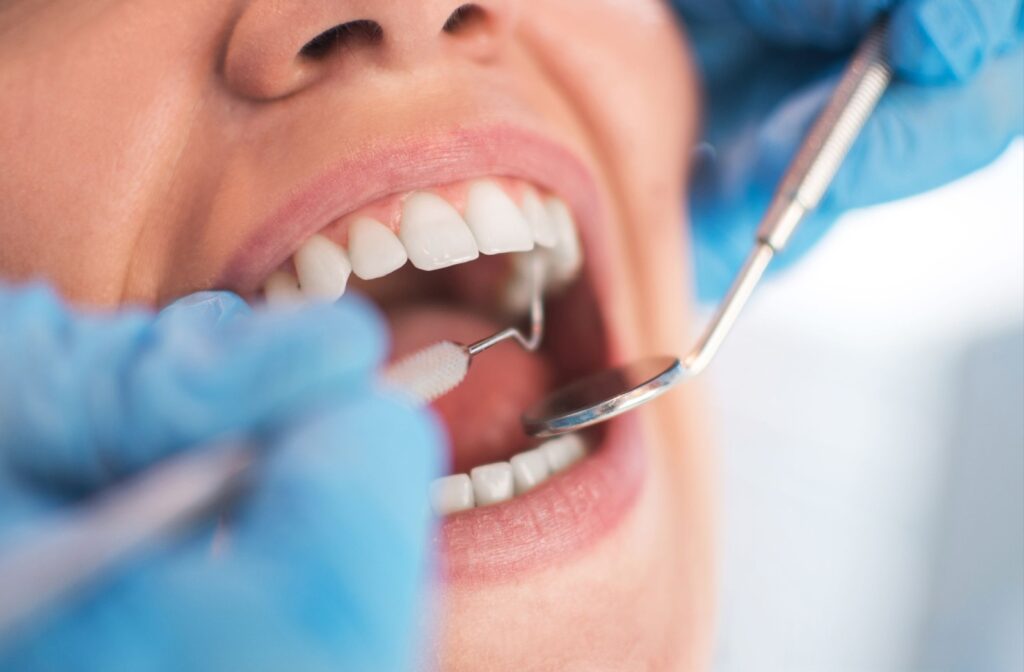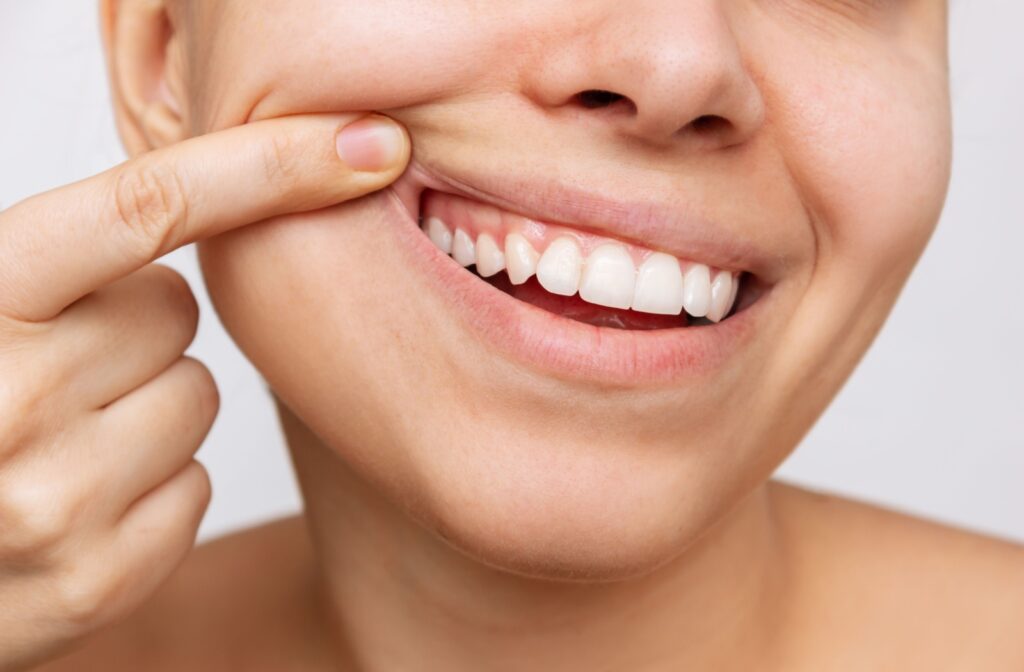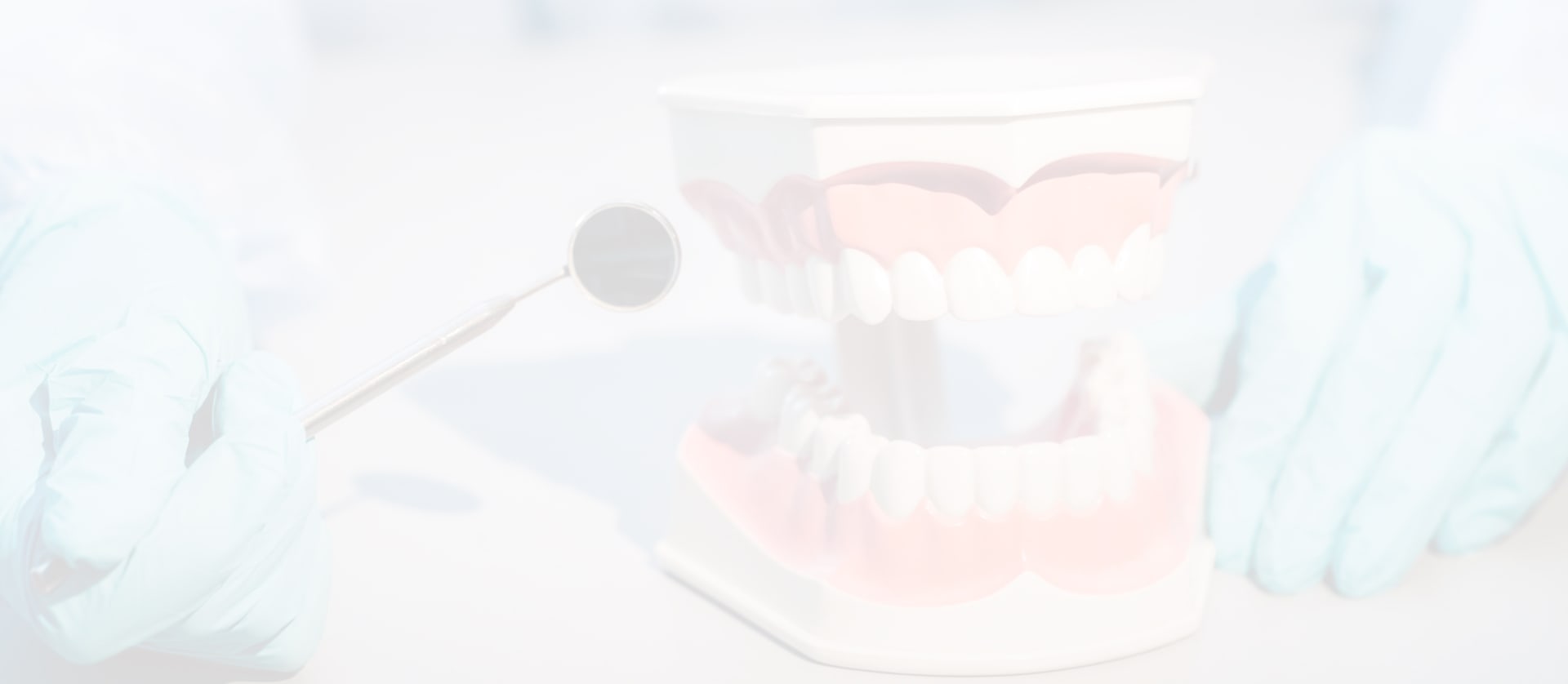Gum disease, also called periodontal disease, isn’t directly contagious, but the bacteria that cause it can spread through saliva. This means that activities like sharing utensils, kissing, or even using the same toothbrush can potentially pass these bacteria from one person to another.
However, developing gum disease depends on a combination of factors, including oral hygiene habits, genetics, and lifestyle choices. While sharing saliva introduces bacteria into another person’s mouth, maintaining good oral hygiene reduces the likelihood of these bacteria causing harm.
Regular visits to your dentist are crucial to monitoring oral health and reducing the risk of gum disease progression.
What Is Gum Disease?
Gum disease develops when harmful bacteria accumulate around your teeth and gums, leading to infection in the tissues that support your teeth. This bacterial buildup forms plaque, a sticky film that coats your teeth throughout the day. When plaque isn’t properly removed, it hardens into tartar, which creates an environment where bacteria can thrive and irritate your gums.
The earliest form of gum disease is gingivitis, where your gums become red, swollen, and prone to bleeding when you brush or floss. The encouraging news is that gingivitis can typically be reversed with improved oral care. However, without proper treatment, it can advance to periodontitis, a more serious condition where gums begin pulling away from teeth, creating pockets that harbor bacteria and can eventually lead to bone deterioration. At this advanced stage, you may experience loose teeth or even tooth loss.
Gum disease ranks among the most widespread oral health issues affecting adults globally, but the encouraging news is that it’s largely preventable and manageable with appropriate care.
How Does Gum Disease Spread?
Although gum disease isn’t contagious in the traditional sense, the harmful bacteria responsible for it can transfer between people through saliva. Activities like sharing meals, beverages, or personal items such as toothbrushes can facilitate this bacterial transfer. Parents might unknowingly pass these bacteria to their children through everyday interactions like sharing utensils or close contact.
The key point to remember is that exposure to these bacteria doesn’t automatically result in gum disease. Your risk depends heavily on your oral hygiene routine, genetics, and overall health habits. Regular brushing and flossing create an environment where these bacteria are less likely to establish themselves and cause problems. For families, teaching children proper oral care from an early age helps create a protective barrier against bacterial transmission.
The Importance of Professional Dental Care
Regular professional dental care plays a vital role in preventing and managing gum disease. Professional cleanings remove stubborn plaque and tartar deposits that home brushing and flossing simply can’t eliminate. This thorough cleaning process helps reduce gum inflammation, prevents the formation of deep bacterial pockets, and maintains overall gum wellness. Catching gum disease in its early stages during routine visits is crucial for successful treatment.
During your visit, your dentist can assess your gum condition and provide personalized recommendations based on your specific situation. If early warning signs of gingivitis are detected, your dentist might suggest more frequent cleanings or recommend specialized oral care products to prevent progression.
Making regular dental appointments a priority is one of the most effective ways to safeguard your gum health.

The Connection Between Gum Health and Overall Health
Did you know that the health of your gums can affect more than just your teeth? Research shows that gum disease can be linked to systemic health conditions like diabetes, heart disease, and even respiratory illnesses. This connection occurs because the inflammation caused by gum disease can enter the bloodstream, potentially impacting other parts of the body.
The bacteria present in your mouth can enter the bloodstream and contribute to inflammation of arterial walls, increasing the risk of cardiovascular diseases. Recent studies even suggest connections between gum disease and neurodegenerative disorders like Alzheimer’s disease. Additionally, an excess of oral bacteria can weaken your immune system by causing chronic inflammation that continuously engages your body’s defenses.
Maintaining good gum health is a critical part of protecting your overall well-being.
Lesser-Known Risk Factors for Gum Disease
While most people know that poor brushing habits increase gum disease risk, several surprising factors can also contribute:
Dry Mouth: Saliva helps protect your teeth and gums by washing away bacteria. Certain medications, medical conditions, or stress can reduce saliva production, making your gums more vulnerable.
Acid Reflux: Stomach acid that comes up into your mouth can irritate your gums and erode teeth.
Mouth Breathing: Breathing through your mouth, especially at night, dries it out and increases bacterial growth.
Frequent Snacking: Even healthy snacks like dried fruits or fresh berries can feed oral bacteria throughout the day, creating repeated acid attacks on your teeth and gums.
Tips for Preventing Gum Disease
The good news is that preventing gum disease starts with simple daily habits you can easily incorporate into your routine:
- Brush twice daily: Use fluoride toothpaste and a soft-bristled toothbrush to remove plaque and keep your enamel strong.
- Floss regularly: Flossing helps remove food particles and plaque from areas your toothbrush can’t reach.
- Use antimicrobial mouthwash: This can reduce harmful bacteria in your mouth and provide extra protection.
- Stay hydrated: Drinking water throughout the day helps rinse away debris and bacteria.
Foods That Support Your Oral Health
Certain foods can naturally support your gum health. Green tea contains antioxidants that fight oral bacteria, while dark chocolate with high cocoa content helps harden tooth enamel. Almonds provide calcium and protein while being low in sugar, making them an excellent snack choice.
Avoiding tobacco products and eating a balanced diet rich in fruits, vegetables, and whole grains also helps strengthen your gums. Regular dental visits allow your dentist to spot issues before they become serious problems.
Protecting Your Smile with Fairlawn Dental Centre
At Fairlawn Dental Centre, we understand that maintaining healthy gums is essential for your overall well-being. From routine cleanings to comprehensive family dentistry, our team takes the time to get to know you, discuss your concerns, and provide guidance to help you maintain healthy gums and teeth.
We believe that a visit with our trusted team should be both thorough and unrushed, allowing us to properly assess your gum health and provide tailored advice for your specific needs. Whether you’re showing early signs of gingivitis or want to take preventative steps, we’re here to help you achieve optimal oral health.
Don’t wait for a small issue to become a bigger problem. Schedule your appointment today and let us guide you toward a healthier smile. Together, we can help ensure your gums and teeth stay strong and healthy for years to come.










